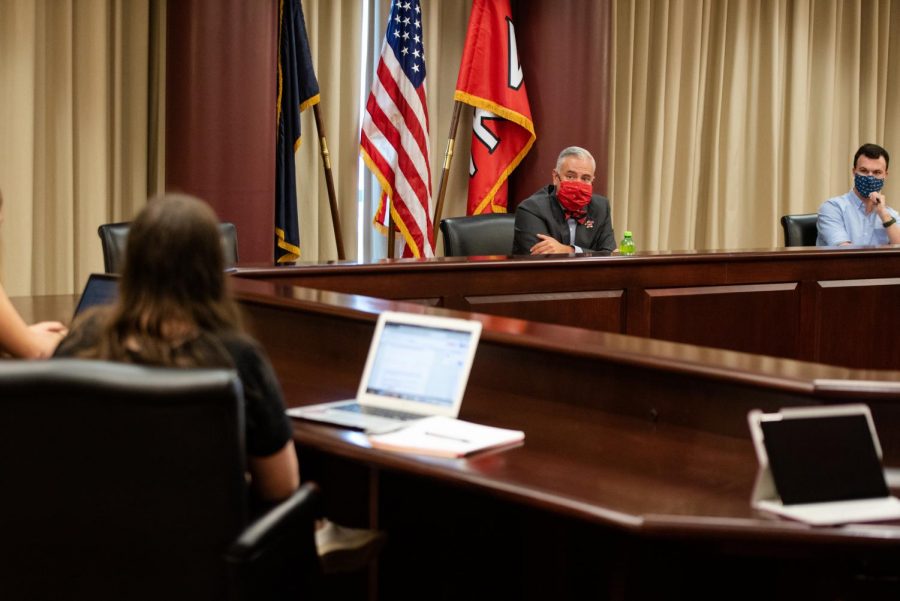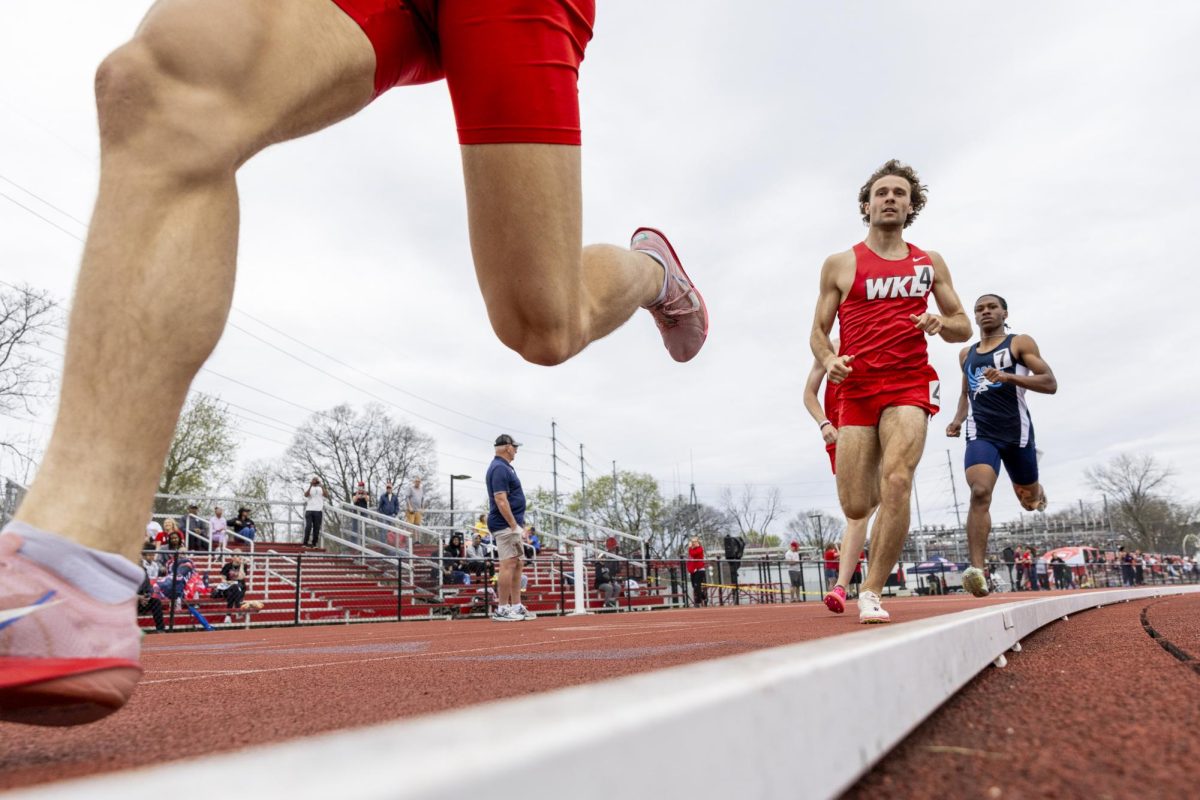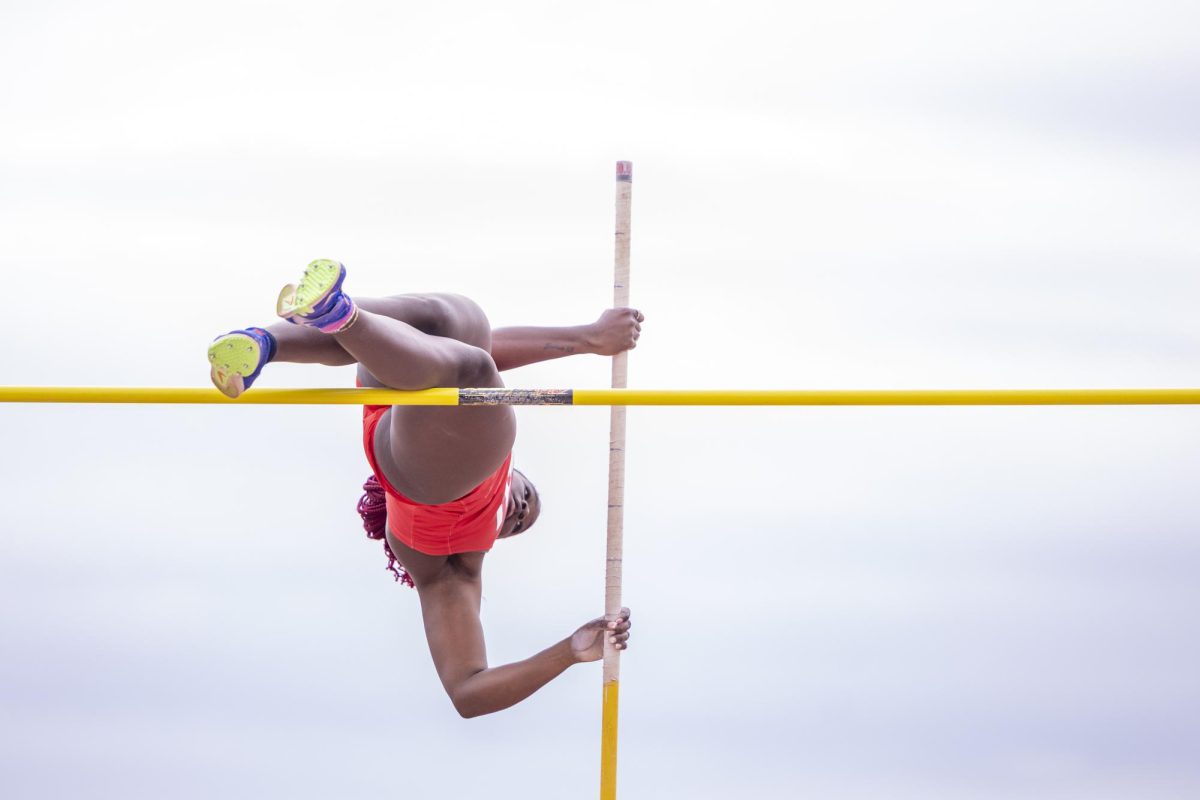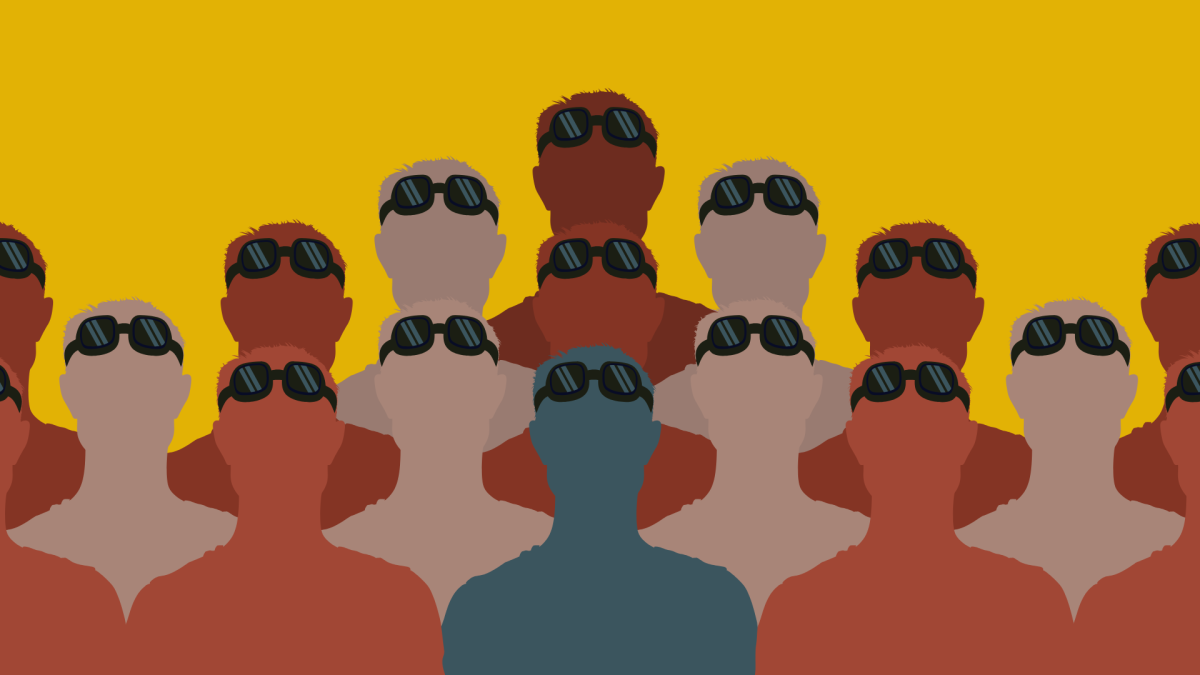7 things we learned from Caboni ahead of the fall semester
August 21, 2020
Ahead of the first day of classes on Monday, WKU President Tim Caboni met with the Herald editorial board, calling the university’s restart a “marathon” requiring each person on campus to “think of everyone else.”
Caboni emphasized the importance of everyone adhering to mask requirements, social distancing and avoiding large gatherings to ensure a healthy restart.
Despite other universities reopening earlier this month and closing relatively quickly, including the University of North Carolina and the University of Notre Dame, Caboni said WKU would be different because of all students, faculty and staff wanting to “do the right thing.”
“It appears that on other campuses, there have been poor choices about large gathering that violate social distancing and masking policies,” Caboni said.
What has to happen for classes to be moved online?
“I know everyone wants to know what’s the number that’s going to cause you to flip a light switch and we’ll go to remote instruction,” Caboni said. “The answer is, we are not going to remote instruction as we did in the spring.”
Caboni said when making decisions, the university watches a variety of metrics to determine safety for in-person instruction. Campus-wide, that includes total number of cases, capacity to quarantine, contact tracing and testing capacity.
As of Friday, there have been 213 reported cases of COVID-19 on campus, including students and faculty. The number is cumulative since July 1.
Masks in classes
If a faculty member were to test positive for COVID-19, it’s not guaranteed their students would need to quarantine. Caboni said all contact tracing would be done through the Barren River Health Department.
“If everyone in a classroom is 6-feet apart and wearing a mask, there’s not a contact that exists there and we think it’s really important to protect the identity of any individuals.”
Caboni said that campus is a zero-tolerance area for individuals wanting to make a statement by not wearing a mask.
“Wearing a mask must become a norm on this campus,” Caboni said.
To create that norm, Caboni said that it is up to the entire WKU community to hold each other accountable by saying something to those not wearing masks on campus.
“Just like wearing masks is on each one of us, so is helping the community comply with that expectation,” Caboni said.
On-Campus and Off-Campus Gatherings
“On-campus versus off-campus are two different situations,” Caboni said.
On-campus gatherings face rules based on room-size and density as well as those from Healthy on the Hill regulations, Caboni said. The Healthy on the Hill website for student activities includes statements about evaluating if events can be offered virtually and cutting available reservation space among other guidelines and recommendations.
Caboni said that each room has a different number of people who can stay 6 feet apart associated with it.
For off-campus gatherings, Caboni differed to the recommendations of Gov.Andy Beshear which include no groups larger than 10, everyone staying 6-feet apart and having gatherings outdoors.
“I would expect everyone in our community to follow that guidance — faculty, staff and students,” Caboni said.
He also spoke of the student temptation on the first weekend of the semester to go out to parties, see friends and celebrate freedom that students haven’t had for five months or are participating in for the first time.
“But for us to have any sense of normalcy, we’ve got to do this completely differently,” Caboni said. “We can’t just do what we did last year and that means parties that typically have occurred.”
Caboni said he spoke with student leadership and Greek leadership on their part in this effort and the challenge of getting their groups to act “in the interest of the collective instead of themselves.”
In an earlier meeting with the Herald, Bob Skipper, director of media relations, said if someone refuses to follow guidelines, there are processes in place for violating the student code of conduct.
For off-campus cases, Skipper said a campus group blatantly not following the guidelines in an organized setting can be suspended for a semester or a year.
“There are repercussions if they choose to not follow the guidelines,” Skipper said.
Incoming freshman class largest in 30 years
WKU enrollment overall has not been negatively affected by COVID-19, Caboni said.
Caboni said as of Monday, there are 433 more first-year students enrolled this year than last. Although he recognized that number may decrease in the weeks to come, this is the largest gain of students in the freshman class WKU has seen in 30 years. He attributed this to the university’s new scholarship program and marketing effort.
In addition to growing in the number of students, the GPA of this year’s freshman class is higher than ever before with a 3.45 average.
“I am really pleased in addition to growing in quantity, the quality of high school GPA also is the highest ever in the history of WKU,” Caboni said.
First-to-second year retention rate is at 77.1%. That is up 1% from the year before. The goal rate is 80%. Due to the pandemic, Caboni said the university made the decision not to dismiss students with academic and financial challenges this year.
On the back end of the student population, the university awarded more than 3,000 bachelor’s degrees this year, which is the largest number in the history of WKU.
“Hopefully this is the beginning of a trend,” Caboni said.
Update for sports on The Hill
Caboni has been attending weekly meetings with Conference USA and other conference university presidents. They are meeting to navigate through what Caboni said is a challenging time.
“The focus for C-USA and WKU will always be what is the health and safety of our student athletes and protecting them,” Caboni said. “From my perspective, whatever we do we have to make sure our students are safe and have met testing protocols, so do our opponents as well.”
Not only do the student athletes at WKU have to meet protocols but so do the teams the Hilltoppers will play this fall. In order to go to schools like the University of Louisville and Brigham Young University the football program must meet the hosts guidelines before a down is played.
No overall conference decision has been made for stadium capacity limits.
“If you look at what other institutions are doing nationally, somewhere between in the 20 to 25% range seems to be typical there are some outliers, I’m not going to call them out but I think we have to be smart about not creating a situation where this virus can spread because people want to see sports,” Caboni said.
There is currently no plan for fans to safely gather prior to home games or tailgating. The main core of WKU’s protocols is educating the students. Caboni doesn’t want to create an environment where there are large gatherings without masks, he said.
BYU has been added to the 2020 schedule for the Hilltoppers. BYU’s mascot Cosmo and Big Red went head to head in the Sirius XM Mascot Bracket Championship poll back in April. Cosmo came out on top, amassing 51% of the total votes.
The Hilltoppers will travel to BYU on Halloween and kickoff is still not decided. Originally WKU was slated to host Old Dominion University for homecoming, but the Monarchs postponed fall sports Aug. 10.
Caboni confirmed that no game has been dubbed the homecoming game yet.
“I am very excited to add BYU to the list of institutions against whom we are competing,” Caboni said. “That is a storied program that we had a heated mascot battle with during the early stages of the pandemic. I am thankful and pleased that we’re going to be able to continue some of that rivalry that began there.”
Having the mid-September game against U of L gives WKU time to observe what happens with other schools across the nation.
“In times of crisis sometimes top-down leadership keeps things more clear and more simple, but the NCAA has never been organized as a top-down organization,” Caboni said. “It’s always been an affiliation of conferences and divisions. That makes decision making messy.”
Caboni said the university will not disaggregate student, faculty, or staff data from reported coronavirus cases on the dashboard, including specific data on student athletes.
There is a level of uncertainty as far as the athletics budget goes and for the university as a whole. People who have had season tickets and converted the season tickets into a gift have had good results, according to Caboni.
“There’s been some positive results around maintaining some portion of that revenue of athletics,” he said.
Dining and other social spaces
Caboni said he was certain that the Healthy on the Hill guidelines for dining venues will allow for students to safely choose to dine at on-campus restaurants. Caboni noted that there is risk associated with on-campus dining.
The Healthy on the Hill guidelines include subheadings for Cleaning and Sanitation, Hand Hygiene, Chemicals, Equipment & PPE and Product Safety. There are no other guidelines currently stated on the website about restaurant capacity or contactless interactions.
“What we’ve created is enough space, within, for example, Fresh Food, for you and your dining companions,” Caboni said.
Caboni expects that all students wear masks, stay 6 feet apart and practice proper hygiene in social spaces, which will help ensure that dining areas can remain open for socialization.
“Students who decide to go sit down and have a meal in a common area can take their mask off,” Caboni said. “Hopefully they’re staying far enough away from other folks in the space that it’s over 6 feet.”
As long as students, faculty and staff are staying 6 feet apart in social spaces, Caboni expects for common areas on campus like DSU and Garrett to be open for dining and studying when fall classes begin.
On-campus resources
When WKU switched to online classes in the spring, students were removed from their on-campus housing and given a partial refund of their meal plans. If WKU goes remote this fall, Caboni expects the condition of these resources to be different this time.
“If we were to switch that dimmer switch,” Caboni said of the university moving to remote instruction, “we would continue to maintain the services on campus on which our students depend.”
In the case that WKU does transition to online learning at some point in the semester, on-campus housing and meal plans will still be operational. Food will be available, as will a place for students to live.
“The misconception is that we would do again this fall what we did in the spring,” Caboni said. “The reality is that we’ve had much more time to prepare. We know much more about how this virus spreads.”
No specifics were given about the changes that would be made to housing and dining operations if WKU transitions to remote learning.
Lily Burris, Laurel Deppen, Nick Kieser, Julianna Lowe, Abbey Nutter and Ellie Tolbert contributed to this report.















